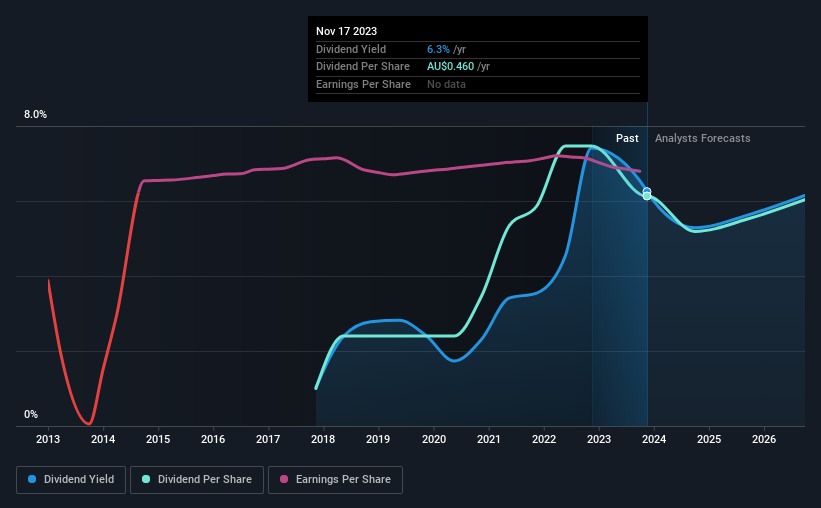
Elders Limited (ASX:ELD) is reducing its dividend from last year's comparable payment to A$0.23 on the 20th of December. This means the annual payment is 6.3% of the current stock price, which is above the average for the industry.
Check out our latest analysis for Elders
Elders' Dividend Is Well Covered By Earnings
A big dividend yield for a few years doesn't mean much if it can't be sustained. Before this announcement, Elders was paying out 71% of earnings, but a comparatively small 59% of free cash flows. Since the dividend is just paying out cash to shareholders, we care more about the cash payout ratio from which we can see plenty is being left over for reinvestment in the business.
EPS is set to grow by 11.8% over the next year. If recent patterns in the dividend continues, the payout ratio in 12 months could be 80% which is a bit high but can definitely be sustainable.

Elders Is Still Building Its Track Record
It is great to see that Elders has been paying a stable dividend for a number of years now, however we want to be a bit cautious about whether this will remain true through a full economic cycle. The annual payment during the last 6 years was A$0.075 in 2017, and the most recent fiscal year payment was A$0.46. This works out to be a compound annual growth rate (CAGR) of approximately 35% a year over that time. The dividend has been growing rapidly, however with such a short payment history we can't know for sure if payment can continue to grow over the long term, so caution may be warranted.
Dividend Growth May Be Hard To Achieve
The company's investors will be pleased to have been receiving dividend income for some time. However, initial appearances might be deceiving. Unfortunately, Elders' earnings per share has been essentially flat over the past five years, which means the dividend may not be increased each year.
Our Thoughts On Elders' Dividend
Overall, the dividend looks like it may have been a bit high, which explains why it has now been cut. In the past, the payments have been unstable, but over the short term the dividend could be reliable, with the company generating enough cash to cover it. We would probably look elsewhere for an income investment.
Market movements attest to how highly valued a consistent dividend policy is compared to one which is more unpredictable. Meanwhile, despite the importance of dividend payments, they are not the only factors our readers should know when assessing a company. As an example, we've identified 2 warning signs for Elders that you should be aware of before investing. Looking for more high-yielding dividend ideas? Try our collection of strong dividend payers.
Valuation is complex, but we're here to simplify it.
Discover if Elders might be undervalued or overvalued with our detailed analysis, featuring fair value estimates, potential risks, dividends, insider trades, and its financial condition.
Access Free AnalysisHave feedback on this article? Concerned about the content? Get in touch with us directly. Alternatively, email editorial-team (at) simplywallst.com.
This article by Simply Wall St is general in nature. We provide commentary based on historical data and analyst forecasts only using an unbiased methodology and our articles are not intended to be financial advice. It does not constitute a recommendation to buy or sell any stock, and does not take account of your objectives, or your financial situation. We aim to bring you long-term focused analysis driven by fundamental data. Note that our analysis may not factor in the latest price-sensitive company announcements or qualitative material. Simply Wall St has no position in any stocks mentioned.
About ASX:ELD
Elders
Provides agricultural products and services to rural and regional customers primarily in Australia.
Undervalued moderate.
Similar Companies
Market Insights
Community Narratives



